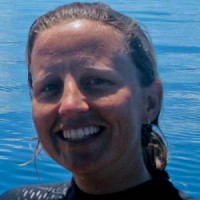Alyssa Marshell
PhD Graduate
University of Queensland

From 2005 to 2022, the main node of the ARC Centre of Excellence for Coral Reef Studies was headquartered at James Cook University in Townsville, Queensland (Australia)








Alyssa was lucky to spend her teenage years growing up on the gorgeous northern New South Wales coast, where she snorkelled regularly and learnt to dive as part of the high school curriculum there. She completed her Bachelor of Science degree majoring in marine biology at James Cook University in Townsville before heading off to explore the world working in the dive and tourism industries. Alyssa eventually ended up at the University of Guam Marine Lab in Guam, Micronesia where she completed her Masters of Science degree investigating unicornfish movement patterns and population dynamics under the supervision of Dr Jennifer McIlwain, and worked as a Graduate Research Assistant with the Government of Guam Coral Reef Monitoring Group. Alyssa completed her PhD investigating the ecological roles of herbivorous surgeonfish on coral reefs, under the supervision of Professor Peter Mumby, Dr Alastair Harborne and Dr Ian Tibbetts.
New DNA techniques are being used to understand how coral reacted to the end of the last ice age in order to better predict how they will cope with current changes to the climate. James Cook Univer
A new study on the effects of climate change in five tropical countries has found fisheries are in more trouble than agriculture, and poor people are in the most danger. Distinguished Profess
James Cook University researchers have found brightly coloured fish are becoming increasingly rare as coral declines, with the phenomenon likely to get worse in the future. Christopher Hemingson, a
Researchers working with stakeholders in the Great Barrier Reef region have come up with ideas on how groups responsible for looking after the reef can operate more effectively when the next bleaching
Abstract: As marine species adapt to climate change, their heat tolerance will likely be under strong selection. Individual variation in heat tolerance and its heritability underpin the potential fo
Abstract: The Reef Ecology Lab in KAUST’s Red Sea Research Center explores many aspects of movement ecology of marine organisms, ranging from adult migrations to intergenerational larval dispersal
Abstract: Macroalgal meadows are a prominent, yet often maligned component of the tropical seascape. Our work at Ningaloo reef in WA demonstrate that canopy forming macroalgae provide habitat for ad
Abstract: Sharks are generally perceived as strong and fearsome animals. With fossils dating back at least 420 million years, sharks are not only majestic top predators but they also outlived dinosa
Abstract: Connectivity plays a vital role in many ecosystems through its effects on fundamental ecological and evolutionary processes. Its consequences for populations and metapopulations have been
Abstract: Evolution of many eukaryotic organisms is affected by interactions with microbes. Microbial symbioses can ultimately reflect host’s diet, habitat range, and even body shape. However, how
Abstract: The past few years have seen unprecedented coral bleaching and mortality on the Great Barrier Reef (GBR) but the consequences of this on biodiversity are not yet known. This talk will expl